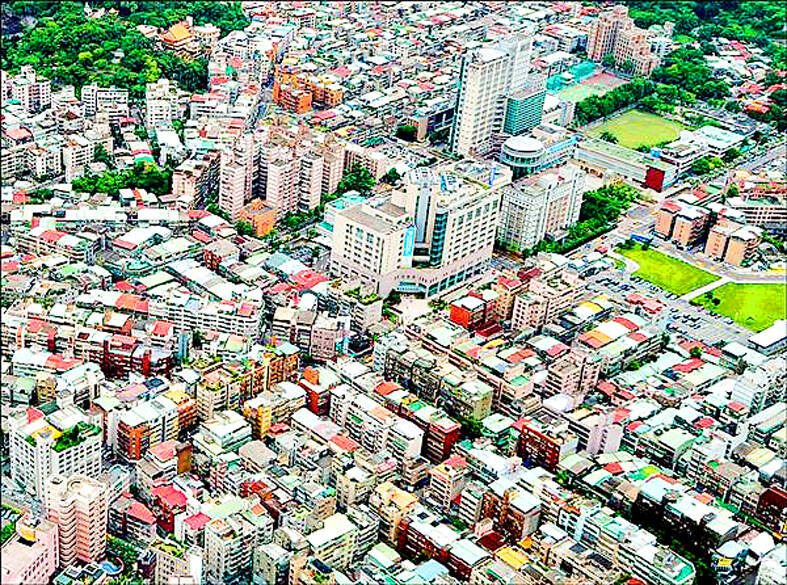Taipei’s population dropped below 2.5 million in September, with people aged 30 to 50 making up the largest group leaving the capital, Taipei City Government data showed.
The number of registered residents in Taipei rebounded to 2.5 million in May last year before rising to 2.51 million in December last year, the data showed.
However, that figure fell to 2,498,210 by September, and as of last month, Taipei had 2,493,210 registered residents.

Photo: Taipei Times
Among those who have moved out of the city, 8,987 were aged 20 to 30, 13,982 were aged 30 to 40, 15,647 were aged 40 to 50 and 9,649 were aged 50 to 60, the data showed.
Taipei Department of Civil Affairs Commissioner Chen Yung-te (陳永德) said the city has been losing about 2,000 to 3,000 residents to other cities every month this year due to the high cost of living and housing prices.
“Most of the people leaving move to areas near MRT lines or the high-speed rail system, with 80 percent moving to New Taipei City and 20 percent to Taoyuan,” he said.
People leaving Taipei’s Wanhua District (萬華) mostly move to New Taipei City’s Banciao District (板橋), while those in Taipei’s Nangang District (南港) move to New Taipei City’s Sijhih District (汐止), he said.
Moving to New Taipei City reduces housing prices without adding too much extra time to commutes, he said.
The drop in registered residents was most apparent in 2022. Daan District (大安) had the smallest population decrease that year, followed by Shihlin (士林) and Beitou (北投) districts, department data showed.
Taipei City Councilor Chen Yu-cheng (陳宥丞) of the Taiwan People’s Party, who represents constituents in Neihu (內湖) and Nangang districts, said that married couples likely left because they cannot afford to buy houses in Taipei.
Chen, who grew up in Taipei, said that few of his classmates stayed in Neihu, with most of them moving to New Taipei City’s Linkou District (林口) or Taoyuan because of Taipei’s high housing prices.
“Amid a population drain, who would want to live here? Who would stay behind to take care of elderly residents? Taipei could soon become a city where people only come to work during the day, and turn into a deserted town at night,” he said.
The population decline could also affect the number of city council seats a district has.
Taipei City Councilor Tseng Hsien-ying (曾獻瑩) said that no additional seats would be added to represent residents of Nangang and Neihu districts due to a continual decline of residents.
Aside from offering subsidies to renters, the Taipei City Department of Civil Affairs said that it is planning to introduce policies to increase the city’s population, such as encouraging and assisting renters in making Taipei their registered residence, increasing rental properties available for younger people and helping older residents find rental units.

AGING: As of last month, people aged 65 or older accounted for 20.06 percent of the total population and the number of couples who got married fell by 18,685 from 2024 Taiwan has surpassed South Korea as the country least willing to have children, with an annual crude birthrate of 4.62 per 1,000 people, Ministry of the Interior data showed yesterday. The nation was previously ranked the second-lowest country in terms of total fertility rate, or the average number of children a woman has in her lifetime. However, South Korea’s fertility rate began to recover from 2023, with total fertility rate rising from 0.72 and estimated to reach 0.82 to 0.85 by last year, and the crude birthrate projected at 6.7 per 1,000 people. Japan’s crude birthrate was projected to fall below six,

US President Donald Trump in an interview with the New York Times published on Thursday said that “it’s up to” Chinese President Xi Jinping (習近平) what China does on Taiwan, but that he would be “very unhappy” with a change in the “status quo.” “He [Xi] considers it to be a part of China, and that’s up to him what he’s going to be doing, but I’ve expressed to him that I would be very unhappy if he did that, and I don’t think he’ll do that. I hope he doesn’t do that,” Trump said. Trump made the comments in the context

SELF-DEFENSE: Tokyo has accelerated its spending goal and its defense minister said the nation needs to discuss whether it should develop nuclear-powered submarines China is ramping up objections to what it sees as Japan’s desire to acquire nuclear weapons, despite Tokyo’s longstanding renunciation of such arms, deepening another fissure in the two neighbors’ increasingly tense ties. In what appears to be a concerted effort, China’s foreign and defense ministries issued statements on Thursday condemning alleged remilitarism efforts by Tokyo. The remarks came as two of the country’s top think tanks jointly issued a 29-page report framing actions by “right-wing forces” in Japan as posing a “serious threat” to world peace. While that report did not define “right-wing forces,” the Chinese Ministry of Foreign Affairs was

PREPAREDNESS: Given the difficulty of importing ammunition during wartime, the Ministry of National Defense said it would prioritize ‘coproduction’ partnerships A newly formed unit of the Marine Corps tasked with land-based security operations has recently replaced its aging, domestically produced rifles with more advanced, US-made M4A1 rifles, a source said yesterday. The unnamed source familiar with the matter said the First Security Battalion of the Marine Corps’ Air Defense and Base Guard Group has replaced its older T65K2 rifles, which have been in service since the late 1980s, with the newly received M4A1s. The source did not say exactly when the upgrade took place or how many M4A1s were issued to the battalion. The confirmation came after Chinese-language media reported